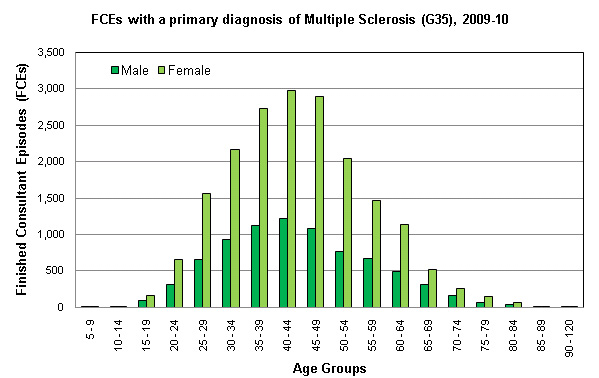IN THIS SITE...

- The Multiple Sclerosis Society
- NHS Choices: Multiple sclerosis
- Inpatient Data
- Self Service
HES on... Multiple sclerosis
What is Multiple Sclerosis?
Multiple Sclerosis (MS) is a condition of the central nervous system (the brain and spinal cord). The central nervous system controls the body's actions and activities, such as movement and balance. Each nerve fibre in the central nervous system is surrounded by a substance called myelin. Myelin helps messages from the brain to travel quickly and smoothly to the rest of the body.
In MS, the myelin becomes damaged. This disrupts the transfer of these messages1.
This can lead to a range of symptoms which sufferers may experience including:
- pain
- visual problems
- muscle spasms and spasticity
- emotional problems
- fatigue and tiredness
- bladder problems
- bowel problems
Who does it affect?
NHS Choices states that:
- Multiple Sclerosis is the most common neurological condition in young adults in the UK, affecting around 85,000 people.
- MS can occur at any age, but symptoms are mostly first seen between the ages of 20 and 40.
- Women are more than twice as likely to develop MS as men. A finding which is consistent, if not more pronounced, in the HES Data below2.
 |
HES facts and figures
HES data for Multiple Sclerosis (primary diagnosis code G35 in ICD-10) shows that in 2009-10:
- most (86%) hospital admissions for Multiple Sclerosis are from waiting lists, rather than emergency admissions
- the average (mean) time that patients remained in hospital was 12.5 days
- 19% of patients who are treated in hospital with multiple sclerosis did not undergo an operative procedure. Of those that did, the three most common procedures were:
- continuous infusion of therapeutic substance (X29 in OPCS-4.5) - 33%
- high cost immunosuppressant drugs (X89 in OPCS-4.5) - 26%
- other intravenous injection (X35 in OPCS-4.5) - 4%.
- it was responsible for 26,804 episodes of admitted patient care, accounting for 86,014 occupied bed days.
More information on this topic is available from NHS Choices through the following:
- 1. The Multiple Sclerosis Society Website - About MS
- 2. NHS Choices, Multiple Sclerosis - Symptoms

